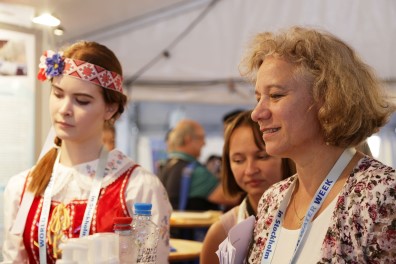“GWP is a knowledge-based organisation, and to this day we struggle with how to get from collecting information on Integrated Water Resources Management (IWRM) to sound knowledge management. GWP’s IWRM ToolBox is a vehicle that supports GWP in making use of a pile of knowledge that exists within our Regional Water Partnerships (RWPs) and Country Water Partnerships (CWPs),” explains Thalmeinerova.
Her job includes identification, collection, and analysis of an enormous diversity of activities in the worldwide GWP network, with the aim to provide a database of structured knowledge on best practices in water resources management.
“My vision is that the ToolBox is the internet-based repository of all GWP knowledge on IWRM, and the first choice site for water practitioners, decision makers, and partners,” says Thalmeinerova.
World Water Week Engagement
Since 2013, Danka Thalmeinerova is also serving on the Scientific Programme Committee (SPC) for the Stockholm World Water Week (WWW) . The Committee plays an essential role in developing the thematic scope of the Water Week.
“Our tasks include a formulation of focus, key headings, and the scope of the Water Week. Sometimes it is challenging because we need to envisage what will be the “hot” agenda more than one year in advance. The seminars should bridge scientific knowledge and academic findings with policy actions. Usually, however, academic research is far ahead of practical implementation. So how do we compose seminars that will bring a diversity of speakers, a good mixture of experiences and practices, in an attractive format and with new ideas to the table?”
“Every year, there are about 3-4 times more applications for seminars and side events than the capacity and duration of Water Week allows. Although there are multiple criteria and strict rules for a selection, some good contributions are left out. It is very important for the SPC members to listen to others, rather than to be in favor of personal agendas or traditionally “secure” topics. During the Water Week in August, SPC members must be very diligent – it is a time to identify suitable partners and potential co-conveners for the next year. And of course, we also need to summarize findings from the current Water Week and provide SIWI with the key messages,” says Thalmeinerova.
Although Dr. Thalmeinerova’s engagement in SPC is time and expertise demanding, she says that it’s a privilege to be a part of a dedicated team.
Junior Water Prize Jury Member
Danka Thalmeinerova’s second involvement with WWW is on the Junior Water Prize Jury. The finalists of national contests from about 28-30 countries come to Stockholm to present their projects. The young people (16-18 years of age) present their works – many of them long-term commitments from school clubs, scientific associations, and research institutes.
“Literally all papers that qualify for the Stockholm “finale” are excellent – they range from practical experiments in laboratories, numerous studies, surveys and serious scientific analyses. Being on a jury stimulates me each year to explore something new. I wish there were more countries that organised national water contests, especially in developing and transition countries. Traditionally, countries such as USA, Canada, Australia, Singapore bring excellent papers that document high tech and well-organised education systems. But there are excellent contributions from countries such as Thailand, Bangladesh, Belarus or Chile, for example,” says Thalmeinerova, and she confesses:
“To be honest, I enjoy much more reading papers and innovations of young people that are not “spoiled” by electronic microscopes, high resolution detectors, and sophisticated IT models. For example, last year, 3 young people from Hungary were able to mobilize and interview about 500 respondents about the drinking water habits and recommend practical measures to save water. Very impressive.”
Each jury member spends a lot of time before WWW going through all the entries, and Thalmeinerova devoted part of her summer vacation to the cause:
“I enjoyed my vacation while I read, studied, and assessed 29 entries for this year’s Junior Water Prize. Of course, I have my favorite – but I cannot say which one. Many things also change during the interview process at WWW. From Sunday to Monday, we interview each finalist. Their posters will be available for all visitors of WWW to see – so don’t miss this, you might guess who will win this year’s Junior Prize yourself!”
Photo: Danka Thalmeinerova perfoming judge duties at WWW 2015.

